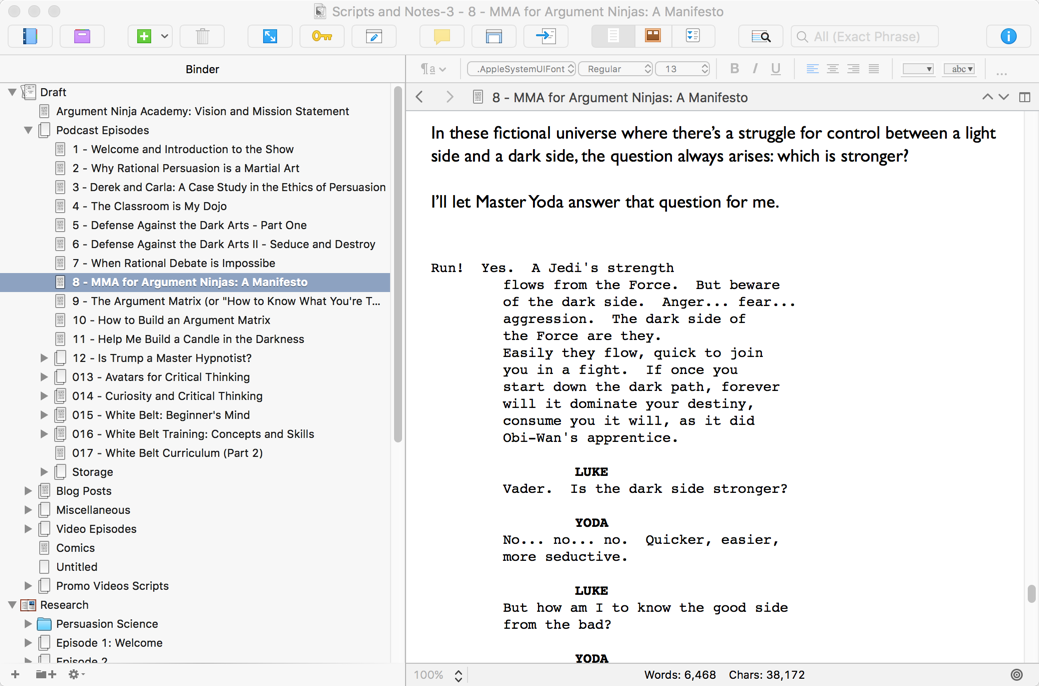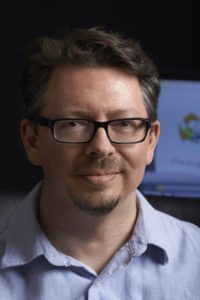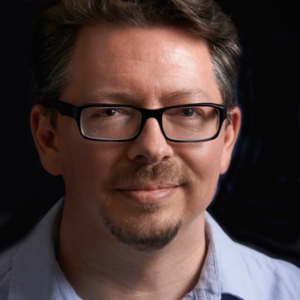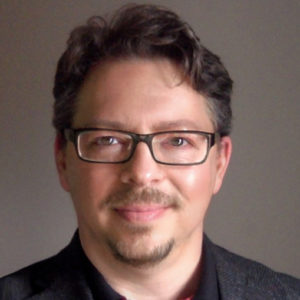There are occasions where an organization needs to grab a short biographical profile and a photo to advertise a speaker for a conference or event. Here’s one that can be adapted for such purposes.
Kevin deLaplante worked for twenty years as an academic philosopher, earning tenure and eventually becoming Chair of the Department of Philosophy & Religious Studies at Iowa State University. He left academia in 2015 to work full time as an independent educator, speaker and consultant specializing in critical thinking skills.
Dr. deLaplante has an undergraduate degree in physics from Carleton University and a PhD in philosophy from Western University. Over the course of his academic career he taught a wide variety of courses in logic and scientific reasoning, critical thinking, the philosophy of science and ethics.
Dr. deLaplante is the creator of the Critical Thinker Academy (criticalthinkeracademy.com), a tutorial site that hosts video courses on critical thinking, logic and argumentation, fallacies, probability, cognitive biases, and argumentative writing and communication. He is also the host of the Argument Ninja podcast (argumentninja.com), where he explores new approaches to critical thinking education.
Here are some head shots. The ones with the blue shirt are from 2015, the one with the jacket is from 2017. Click to see full size.
Need to See an Actual CV/Resume?
Click here for an abbreviated but up-to-date cv/resume.
More Odds and Ends Below
I’m 50 years old, married with two kids. Our son is 16, our daughter is 22.
Here’s a picture of me with our cat Sam. Unfortunately Sam passed away this year (2017).
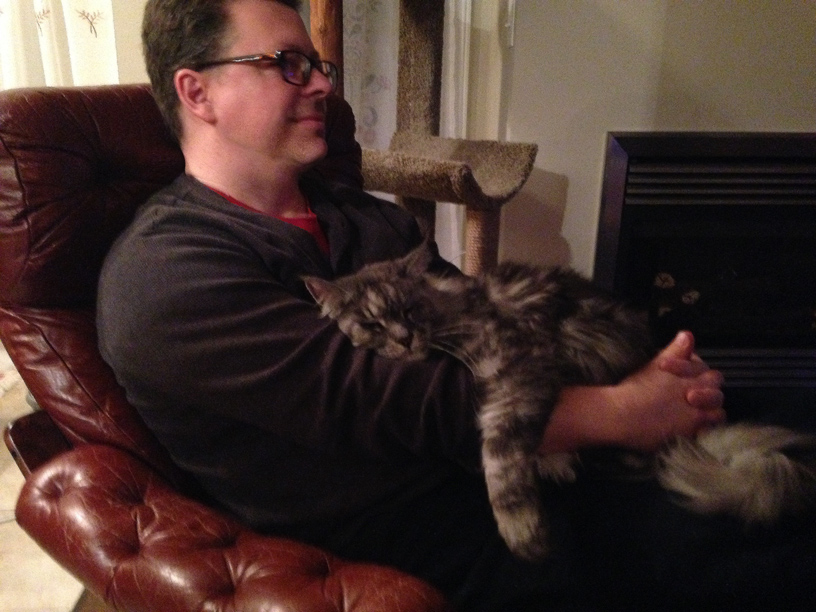
I was born in Ottawa, Ontario, Canada. Studied physics here in Ottawa at Carleton University (1986-91), did graduate studies in philosophy at Western University in London, Ontario (1991-1998).
Taught for a year at Cape Breton University in Nova Scotia (1998-1999), and then got a tenure-track job at Iowa State University in Ames, Iowa, where we lived for sixteen years (1999-2015).
Earned tenure in 2005, served as Department Chair from 2009-2012.
Here’s a video of our son Liam. We went axe-throwing for his birthday this year. Super fun! Makes you feel like a beast!
We homeschooled both our kids until 9th grade. Our daughter went half-time to the local high school in Ames, Iowa, and did the rest of her courses at home. Our son is full-time at a high school in Ottawa.
My So-Called Academic Life
Areas of Research Specialization:
- Philosophy of Science
- Philosophy of Ecology/Biology
- Philosophy of the Complex Systems Sciences
- Environmental Philosophy
- Argumentation and Critical Thinking
- Rationality and the Psychology of Belief and Judgment
Teaching Experience
This list below includes courses taught at Iowa State University, University College of Cape Breton, University of Zagreb, and University of Western Ontario. I’ve grouped them by area.
History and Philosophy of Science
- Philosophy of Science
- Contemporary Philosophy of Science
- Natural Science
- History of Scientific Thought
- Philosophy of Physics
- Philosophy of Biology
- History and Philosophy of Ecology
- Philosophy of Technology
Ethics and Social/Political Philosophy
- Business, Scientific and Environmental Ethics
- Moral Theory and Practice
- Ethics and Law
- Environmental Ethics
- Ethics and Society
- Introduction to Environmental Philosophy
- Professional Issues in Art Therapy
Introduction to Philosophy and Critical Thinking
- Introduction to Philosophy
- Introduction to Problems in Philosophy
- Introduction to Logic and Scientific Methodology
- Symbolic Logic
- Critical Thinking and Computer Applications
Independent Study Courses
- Philosophy of Mathematics
- Perspectives on Ecosystem Health
- Science and Religion
- Feminism and the Ethics of Animals
Select Publications
- (2011) Editor of Philosophy of Ecology (with Bryson Brown and Kent Peacock), volume 11 of the multi-volume Handbook of the Philosophy of Science, senior editors, Dov Gabbay, Paul Thagard and John Woods.
- (2011) “The Biodiversity-Ecosystem Function Debate (with Valentin Picasso) in deLaplante, K, Brown, B. and Peacock, K., (eds) Philosophy of Ecology, Vol. 11 in the Handbook of the Philosophy of Science, Elsevier.
- (2011 – with David Alexander) “Commentary on Bondy’s ‘Against Epistemic Circularity’”, in Zenker, F. (ed.). Argumentation: Cognition and Community. Proceedings of the 9th International Conference of the Ontario Society for the Study of Argumentation (OSSA), May 18-21, 2011. Windsor, ON (CD ROM), pp. 1-5.
- (2009) “Eugene Odum”, in Encyclopedia of Environmental Ethics and Philosophy, Volume 2, senior editors J. B. Callicott and R. Frodeman. Macmillan Reference USA, Thomson-Gale. pp. 120-121.
- (2009) “Philosophy of Ecology: An Overview”, for Encyclopedia of Ecology, 1st Edition, Elsevier Academic Publishers, senior editors Sven Jorgensen and Brian Fath, pp. 2709-2715.
- (2006) “Sources of Domain-Independence in the Formal Sciences” in Benedikt Lowe, Volker Peckhaus and Thoralf Rasch (eds.) Foundations of the Formal Sciences: The History of the Concept of the Formal Sciences, College Publications, pp. 1-16.
- (2005) “Making the Abstract Concrete: How a Comic Can Bring to Life the Central Problems of Environmental Philosophy”, in J. McLaughlin (ed.) Comics as Philosophy, University Press of Mississippi.
- (2005) “Is Ecosystem Management a Postmodern Science?”, for K.E. Cuddington and B.E. Beisner (eds.) Ecological Paradigms Lost: Routes of Theory Change, Academic Press, pp. 397-418.
- (2004) “Environmental Alchemy: How to Turn Ecological Science into Ecological Philosophy”, Environmental Ethics 26: 361-80.
- (2004) “Can You Teach Environmental Philosophy Without Being an Environmentalist?”, Worldviews: Nature, Culture, Religion 8(2): 198-212.
- (2004) “Toward a More Expansive Conception of Ecological Science”, Biology and Philosophy 19: 263-281.
- (1999) “Certainty and Domain-Independence in the Sciences of Complexity: A Critique of James Franklin’s Account of Formal Science”, Studies in History and Philosophy of Science 30: 699-720
You can see that most of my published research was in the area of the history and philosophy of ecology and topics in environmental philosophy.
My doctoral dissertation was in this area, so that made sense. But my main areas of interest were always in the philosophy of physics and related issues in the philosophy of science (the nature of time and space, for example). I didn’t do a dissertation in this area, though, because there are a ton of super smart people working in these fields already, and have been for many decades. As a grad student I was looking for new areas in the philosophy of science that hadn’t been explored yet.
Interesting Fact
I spent a lot of years in academia not writing what I was supposed to be writing.
I quit academia and now I write more than I ever did. I write almost every day. When I was an academic I would go months without writing anything.
In March 2017 I checked my Scrivener word count stats for the podcast scripts and the articles written for my sites.
That’s 138,629 words, written since last summer (July 2016). (Note: A 400 page book is about 100,000 words, very roughly.)
I also read a lot more, and more widely.
Some of this is because I’m not in a classroom teaching of course. But running a business takes time too. It’s not that I have extra time to read and write. It’s that I’m actually free to read and write what I want and only what I want.
(Another big difference, of course, is that now my writing pays the bills. But trust me, if I didn’t enjoy the writing I would never do it ….)
